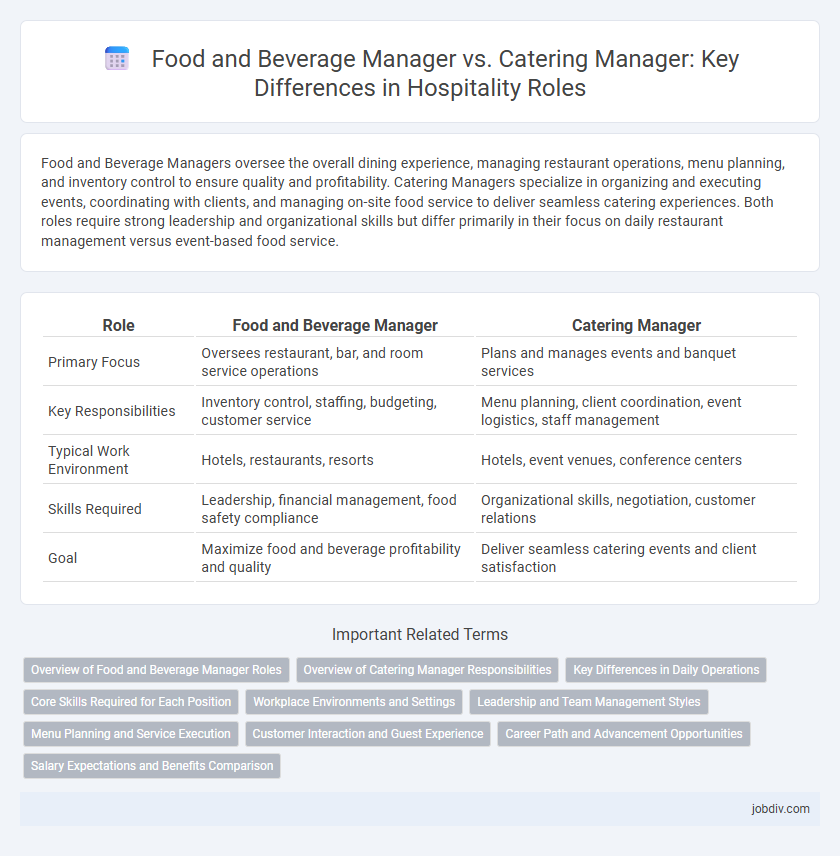Food and Beverage Managers oversee the overall dining experience, managing restaurant operations, menu planning, and inventory control to ensure quality and profitability. Catering Managers specialize in organizing and executing events, coordinating with clients, and managing on-site food service to deliver seamless catering experiences. Both roles require strong leadership and organizational skills but differ primarily in their focus on daily restaurant management versus event-based food service.
Table of Comparison
| Role | Food and Beverage Manager | Catering Manager |
|---|---|---|
| Primary Focus | Oversees restaurant, bar, and room service operations | Plans and manages events and banquet services |
| Key Responsibilities | Inventory control, staffing, budgeting, customer service | Menu planning, client coordination, event logistics, staff management |
| Typical Work Environment | Hotels, restaurants, resorts | Hotels, event venues, conference centers |
| Skills Required | Leadership, financial management, food safety compliance | Organizational skills, negotiation, customer relations |
| Goal | Maximize food and beverage profitability and quality | Deliver seamless catering events and client satisfaction |
Overview of Food and Beverage Manager Roles
Food and Beverage Managers oversee all operations related to dining services within hospitality establishments, including menu planning, inventory control, staff management, and ensuring compliance with health and safety regulations. Their responsibilities encompass managing budgets, coordinating with suppliers, and enhancing guest satisfaction through quality food and beverage offerings. Unlike Catering Managers who focus primarily on event-specific services, Food and Beverage Managers maintain broad oversight of daily restaurant and bar functions to optimize overall profitability and operational efficiency.
Overview of Catering Manager Responsibilities
A Catering Manager oversees the planning, coordination, and execution of catered events, ensuring seamless service from menu selection to delivery and setup. Responsibilities include managing client relationships, negotiating contracts, supervising catering staff, and maintaining quality control to meet specific event requirements. This role demands strong organizational skills and close collaboration with chefs, vendors, and event planners to guarantee customer satisfaction and efficient service.
Key Differences in Daily Operations
Food and Beverage Managers oversee all dining services, inventory control, and supplier relations to ensure consistent quality and profitability across restaurants, bars, and room service in a hotel or resort. Catering Managers focus specifically on planning, organizing, and executing events by coordinating menus, staffing, and logistics tailored to client requirements and venue constraints. Daily operations for Food and Beverage Managers involve broad oversight of multiple outlets and revenue streams, while Catering Managers dedicate efforts to event-specific timelines, client communication, and onsite service delivery.
Core Skills Required for Each Position
A Food and Beverage Manager must excel in inventory management, cost control, and quality assurance to oversee diverse dining operations efficiently. A Catering Manager requires strong event planning, client communication, and team coordination skills to execute seamless catered events. Both roles demand leadership and problem-solving abilities but focus on different operational and client-facing aspects of hospitality service.
Workplace Environments and Settings
Food and Beverage Managers typically work within hotel restaurants, bars, and resort dining areas, overseeing daily operations and ensuring customer satisfaction in fast-paced environments. Catering Managers operate predominantly in event venues, banquet halls, and conference centers, managing large-scale food service for weddings, corporate events, and parties. Both roles require coordination with kitchen and service staff but differ in their focus on ongoing hospitality operations versus event-specific catering logistics.
Leadership and Team Management Styles
Food and Beverage Managers emphasize cross-departmental leadership, coordinating front-of-house and kitchen teams to enhance guest dining experiences through strategic scheduling and operational efficiency. Catering Managers focus on event-specific team management, leading flexible groups to deliver customized service while adapting quickly to client needs and on-site challenges. Both roles require strong communication skills and the ability to motivate diverse teams, but the Food and Beverage Manager oversees ongoing operations, whereas the Catering Manager drives short-term, event-focused teamwork.
Menu Planning and Service Execution
Food and Beverage Managers oversee comprehensive menu planning that balances cost control with customer preferences, ensuring profitability and quality across multiple outlets. Catering Managers specialize in customized menu design tailored to specific events, coordinating timely service execution to meet client expectations and event schedules. Both roles demand strategic collaboration with kitchen staff and service teams to deliver seamless dining experiences.
Customer Interaction and Guest Experience
Food and Beverage Managers oversee overall dining operations, ensuring seamless service quality and managing customer interactions across various outlets, which directly enhances the guest experience through consistent standards. Catering Managers specialize in event-specific food service, focusing on personalized guest engagement and tailored menu planning to meet client preferences and occasion requirements. Both roles require strong communication skills, but Catering Managers often engage more deeply with clients to customize offerings, while Food and Beverage Managers maintain broader oversight of daily customer satisfaction.
Career Path and Advancement Opportunities
Food and Beverage Managers typically advance by gaining broader operational experience, moving into roles like Director of Food and Beverage or Hotel General Manager, leveraging skills in menu planning, budgeting, and staff management. Catering Managers often progress through event coordination and sales expertise, transitioning into senior catering director roles or corporate event management positions within hospitality groups. Career advancement in both paths demands strong leadership, client relationship management, and strategic planning competencies.
Salary Expectations and Benefits Comparison
Food and Beverage Managers typically earn an average salary of $55,000 to $85,000 annually, with benefits including health insurance, paid time off, and performance bonuses. Catering Managers generally have a slightly lower salary range of $45,000 to $75,000 but often receive commissions based on event success and flexible scheduling benefits. Both roles offer opportunities for career advancement within the hospitality industry, with salary variations influenced by location, establishment size, and experience level.
Food and Beverage Manager vs Catering Manager Infographic

 jobdiv.com
jobdiv.com